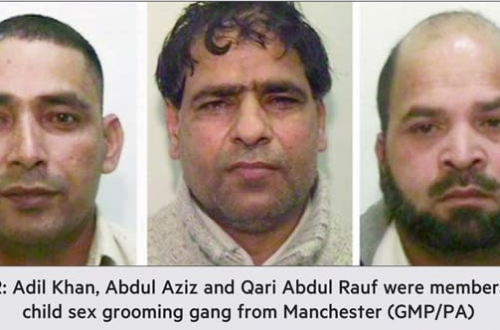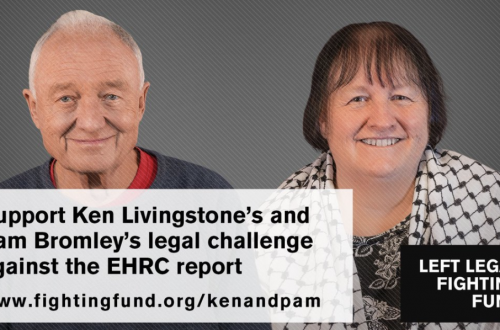This is a cross post by Meredith Tax
Three weeks ago, I was on a panel at John Jay College’s Center for International Human Rights, organized by the Centre for Secular Space, a new thinktank formed to “oppose fundamentalism, strengthen secular voices, and promote universality in human rights.” One way to do this is to provide information that is hard to find elsewhere. On this occasion, Ariane Brunet, a Canadian human rights expert, galvanized the room by saying that the revolution in Tunisia actually began with a strike by women garment workers ten years ago; these workers subsequently played a leading role in the protests that led up to the exit of dictator Ben Ali in January, 2011.
This is not the story one hears in the US press, where the emphasis has been on the rise of the “moderate Islamist” party Ennadha, which won a plurality of 42% in the recent election for a constituent assembly and has formed a governing coalition with two liberal parties. Rachid Ghanouchi, the leader of Ennadha, has become the darling not only of the US State Department and the New York Times but of leftwing thinkers at the Guardian and the Institute for Policy Studies, where Rob Prince wrote recently:
“Although there have been concerns circulating among neoconservative circles and the French ruling class that the stunning Ennahda victory suggests some kind of Sharia state just around the corner in Tunisia, the response in the United States and Europe has been mostly positive…. Claims that Ennahda is some reincarnation of the Afghan Taliban or a Tunisian version of the Saudi Wahhabist movement are so far off the mark as to be ludicrous. While of course there will be political differences between Ennahda and its more secular coalition partners, there will be no Taliban-style Sharia in Tunisia, nor are the gains that Tunisian women have enjoyed since 1956 likely to be seriously eroded.”
Despite this hopeful appraisal, and the fact that Ghannouchi is criticized by more authoritarian Islamists, many Tunisians say Ghannouchi speaks out of both sides of his mouth.
“The party ran an unveiled woman as an election candidate, vowed not to touch laws banning polygamy and ensuring equal rights in divorce and inheritance that some say are at odds with Islamic Sharia, and presented a programme differing little from that of secularists…. Yet Tunisian commentator Rachid Khechana said many in Ennahda give different messages in their own communities. ‘They use different rhetoric in the rural areas where it’s more conservative: rhetoric about stopping culture from outside, corruption of youth and defending Islam,’ he said. ‘In the mosque, they tell their believers they should not fear what they hear them saying on TV.'”
Please note that the fashionable new term “moderate Islamist” does not necessarily imply moderation on issues like women’s and gay rights; it merely implies a willingness to achieve a strict Islamic state through elections and social pressure rather than violence. But social pressure can be extremely coercive. According to Tunisian student leader Halel Sayeh: “Nous avons déjà vu à l’œuvre cette pression sociale qui a poussé d’innombrables femmes à opter pour le hijab, de peur d’être mal perçues dans leur milieu social fraichement radicalisé.” [We have already seen the work of this social pressure, which has pushed innumerable women to opt for the hijab, for fear of being considered immoral in their newly-radicalized social environment.]
Certainly Islamists—whether Ennadha members or less “moderate” salafis—have been on the rampage in Tunis. Ariane Brunet laid out a sequence of troubling events: a mob attack on the Grande Synagogue de Tunis, and assaults on unveiled women (most women in Tunis are unveiled) and women sitting in cafes, who were beaten with sticks by Islamist mobs. Then there was the violent censorship of Nadia el Fani’s film Laïcité Inch’Allah (Secularism, God Willing),including death threats against the director, destruction of the movie theatre where it played, and a physical attack on the theatre’s director. Last month an Islamist mob made a similar attack on a cable TV station that showed the Arabic language version of Marjane Satrapi’s animated film Persepolis, in which a little girl has imaginary conversations with God, who is drawn as a bearded man. The home of the owner of the station was also attacked. Although Ennadha disclaimed responsibility for these mobs, it opposed the showing ofPersepolis and Ghannouchi clearly supported the idea of mob censorship in aninterview, saying the masses wanted to express their indignation.
One test of the “moderate Islamists” of Ennadha will be whether they are willing to use the police powers of the new coalition government to secure human rights. Will they defend freedom of expression if that free expression offends some Muslims? Will they insist that the police protect unveiled women, transsexuals, and Christians who are attacked by Islamist mobs? We shall see.
Meanwhile, in the US we too are having problems with the interface between religious extremism and human rights. Yesterday, citizens of Mississippi voted on a “personhood” amendment to the state constitution declaring a fertilized egg a legal human being. This would have criminalized not only abortion, but any form of birth control that prevents a fertilized egg from attaching to the uterus, including the IUD and the morning after pill. As Susan Jacoby says, “Make no mistake about it: Proposition 26 is entirely about the determination of far-right religious institutions to make their brand of faith the legal standard for all matters involving sex, reproduction and women’s (though not men’s) bodies.” The amendment was defeated but its supporters will continue to pursue this goal.
Then there is the publicly funded bus company that serves a community of Hasidic Jews in Kiriat Joel, Monroe County, New York. According to the Jewish Weekly Forward, buses to Kiriat Joel have a curtain stretched down the center aisle, with men sitting on one side and women on the other, so that the men will not be distracted by the sight of a female ankle. Never mind the fact that segregation on public transportation is illegal.
Twenty, even ten, years ago, I would not have believed it possible that sex segregation would be permitted on a publicly funded bus line in New York. But in the US as elsewhere, secular space is being nibbled away, bite after bite, by extremist religious movements and government complicity with them. The consequences of this nibbling are particularly dreadful for women, gays, and religious minorities. Ennadha may be committed to equality for women, but try telling that to the Tunis transsexual whose neighbor just grew a beard and started going to the mosque and is now threatening to kill her.
To fight the imposition of far right religious views, a number of us, scattered around the globe, have started the Centre for Secular Space. You can read our principles on our website; and you can write to us there. As yet we have no office and no paid staff, but some of the smartest and bravest women in the world are behind this initiative, so do follow our website, which will soon add interactive features and seek comments.
Secularism does not mean that everybody has to be an atheist. It means that government, including public education and transportation, must be free of control by religious authority; and that the state should defend religious freedom while opposing religious discrimination and coercion. States that cop out on this job will need to hear from all of us.


